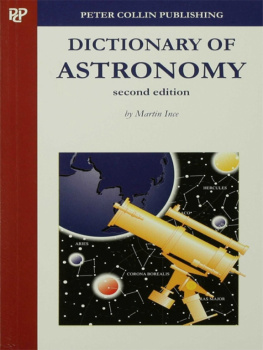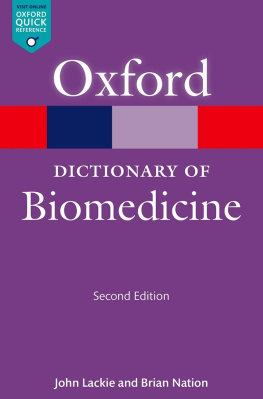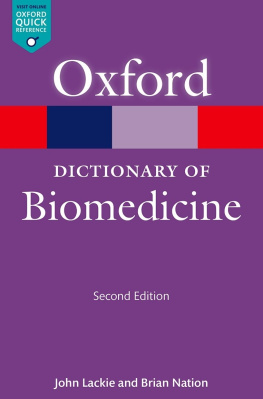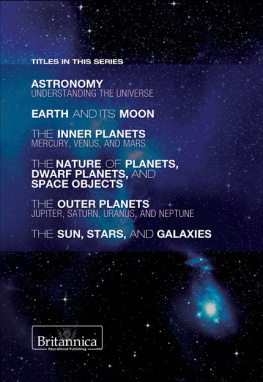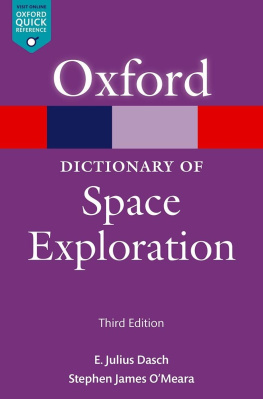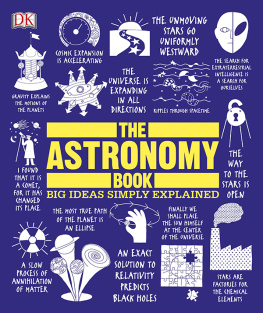DICTIONARY OF
ASTRONOMY
second edition
We publish a wide range of specialist English and bilingual
dictionaries. For full details, visit our website:
www.petercollin.com
or contact:
Peter Collin Publishing Ltd
32-34 Great Peter Street, London, SWIP 2DB
email: info@petercollin.com
In the USA, please contact:
Independent Publishers Group
814 North Franklin Street, Chicago, IL 60610
tel: 312 337 0747 fax: 312 337 5985
DICTIONARY OF
ASTRONOMY
second edition
by Martin Ince

Second edition published 2001
First edition published 1997
published by
Peter Collin Publishing Ltd
32-34 Great Peter Street, London, SW1P 2DB
Text copyright Martin Ince 1997, 2001
Illustrations copyright Tom Hosking, 1997
All rights reserved. No part of this publication may be reproduced in any form or by any means without the permission of thepublishers
British Library Cataloguing in Publication data
A catalogue record for this book is available from the British Library
eISBN: 978-1-40812-106-1
Text computer typeset by PCP
Printed and bound by WS Bookwell, Finland
Cover design by Gary Weston
Contents
Astronomers are fond of claiming that their science is the oldest of all. Every culture in history has had ideas about theuniverse, and ancient carvings and other relics from prehistoric societies show that they, too, thought about the lights inthe sky long before they wrote down words about them. As well as its inherent fascination, astronomy must have been one ofa small number of sciences - like plant and animal breeding - which were vital to our ancestors' survival, because of itsimportance in predicting tides and providing information on the times for crops to be planted.
The sheer antiquity of astronomical thought is a joy for anyone with an interest in ideas. But it is also a severe problemfor anyone trying to produce a comprehensive dictionary of astronomy which will both define the terms used by astronomersand give an idea of their importance. Many thousands of scientists have contributed to our astronomical knowledge, and onlythe most important can be mentioned here. But astronomy is above all a new science. In recent decades astronomers have acquiredthe ability to look at the whole range of radiation emitted from the sky, using radio and infrared telescopes on the Earth'ssurface, and satellites to observe the waves unable to penetrate the Earth's atmosphere. And as the tools available to astronomershave expanded, most spectacularly with the Hubble Space Telescope and the astounding missions to the planets of recent decades,so has the breadth of phenomena they are able to observe and theorise about. If this Dictionary does its job properly, itwill transmit not only the content of this new astronomy but some of its excitement and its rapid rate of change.
The aim of this dictionary is to define the terms used by astronomers from their own subject and from other sciences, especiallyphysics, optics, space science and astronautics, and the environmental sciences, in such as way as to make modern developmentsin astronomy comprehensible and to make clear their importance in the history and texture of the subject.
As well as technical terms, it discusses famous astronomers of the past and present, notable celestial objects such as theplanets and satellites of the solar system, the constellations, bright and nearby stars, other bodies in the sky with someclaim to fame, the instruments and methods used by astronomers to do their work, and past and future space missions of significanceto astronomers. And it goes into the theories and ideas used by astronomers to make sense of the observations they perform.
Modern astronomy is a complex science, although it is still one to which dedicated amateurs make a tangible contribution.If this dictionary succeeds, it will make the complexity less daunting, and replace it with the wonder which is the only properresponse to the beauty of the universe which is now known to us. Contemporary astronomy is not a finished subject, but a fast-movingone whose speed is likely to grow rather than diminish. And our current knowledge allows us a much fuller understanding ofthe universe and our own place in it than has been available to any previous generation.
This book comes with love and thanks to my father. Leslie Ince and my wife, Vicky Hutchings: neither have much interest inastronomy and both have tolerated my fascination for it when plenty of better priorities were being ignored.
Martin Ince
A (star classification)
Class of stars with surface temperature of 7500-10000, and strong spectral lines due to hydrogen. Examples include Sirius,Deneb, Vega and other bright stars. A stars tend to be white or bluish in colour. Apparent in the spectra of A stars are ionisedmetals like magnesium and calcium
AAVSO
THE AMERICAN ASSOCIATION OF VARIABLE STAR OBSERVERS
a well-known US body of amateur and professional astronomers
aberration1
The difference between the observed and the calculated position of an astronomical body caused by the time taken for light,or other radiation, to get from it to the observer
aberration2
The imperfect formation of an image by a telescope or other optical instrument. Varieties include chromatic aberration, thedifferential focussing of light of different wavelengths, spherical aberration, the imperfect focussing of light because ofthe use of spherical rather than parabolic lens or mirror surfaces, coma, the blurring of off-axis images, astigmatism, thedistortion of images because of the irregular curvature of lenses, mirrors or the surface on which the images are formed
absolute magnitude
The magnitude of a star or other astronomical object, seen from a distance of 10 Parsecs. The apparent magnitude of astronomical objects seen from the Earth depends upon their intrinsic brightness and also uponhow far they are from us, so that the Moon can outshine everything else in the night sky by being the nearest astronomicalobject. Comparing astronomical objects as they would appear from a uniform distance removes this effect
absorption line
A dark line seen in a stellar spectrum, caused by radiation passing through a cool medium on its journey to the observer. Absorption lines give information aboutcool matter such as interstellar gas clouds, planetary atmospheres and stellar atmospheres
abundance
The relative amount of a particular type of star, galaxy, atom or other item in an overall population. Elemental abundances,the amounts of different atomic species in meteorites, moonrock etc., yield information about the early history of the solarsystem. The abundances of different types and ages of stars in the galaxy tell us about the evolution of both stars and galaxies.Stellar abundances are the proportions of different atoms in different types of star, and provide information about theirages and development. In the Sun, every million hydrogen atoms are accompanied by 63,000 atoms of helium, the next most abundanttype
accretion
The accumulation of a number of objects to form a single larger one. Accretion is among the commonest of ways for astronomicalobjects to form. In particular it seems that the planets, including the Earth, were built up by the accretion of planetesimals which formed a cloud around the Sun almost five billion years ago. Most of the planetesimals were swept up in the accretionprocess, leaving a small number to appear as comets and other small solar system objects
Next page
